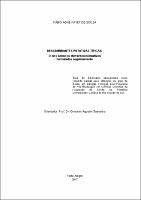| Share record |


|
Please use this identifier to cite or link to this item:
https://tede2.pucrs.br/tede2/handle/tede/7270Full metadata record
| DC Field | Value | Language |
|---|---|---|
| dc.creator | Souza, Fábio Agne Fayet de | - |
| dc.creator.Lattes | http://buscatextual.cnpq.br/buscatextual/visualizacv.do?id=K4770410Y1 | por |
| dc.contributor.advisor1 | Saavedra, Giovani Agostini | - |
| dc.contributor.advisor1Lattes | http://buscatextual.cnpq.br/buscatextual/visualizacv.do?id=K4771551T6 | por |
| dc.date.accessioned | 2017-05-15T16:58:03Z | - |
| dc.date.issued | 2017-03-10 | - |
| dc.identifier.uri | http://tede2.pucrs.br/tede2/handle/tede/7270 | - |
| dc.description.resumo | A presente tese estabelece um critério diferenciador entre a consciência da ilicitude suficiente para a existência do dolo, daquela exigida pelo conhecimento em si da proibição da conduta praticada pelo agente, fixando, assim, os parâmetros para o tratamento do erro sobre o elemento normativo do tipo formulado negativamente, nos mesmos moldes estabelecidos para as descriminantes putativas como solução para o problema do erro. A importância da presente análise consubstancia-se no reconhecimento do erro sobre a ilicitude descrita no tipo, desbordando dos limites do error iuris nocet; é dizer: permite que se analise o erro do agente sobre a proibição da conduta, quando esta vem elencada, de forma explícita, como elemento do tipo penal. Para tanto, procedeu-se uma abordagem dedutiva do tema, por meio da pesquisa bibliográfica de viés histórico-comparativo, para, depois de tecer um panorama sobre a origem e o desenvolvimento do problema, investigar-se, na evolução histórica e no universo dos tipos penais constituídos por estes elementos normativos formulados negativamente, a existência de um critério para a análise individualizada das formulações negativas no âmbito do tipo, delimitando o dolo e a proibição. Desse modo, tal critério permite uma nova leitura acerca do erro sobre os elementos normativos formulados negativamente, no âmbito das descriminantes putativas típicas, permitindo a aplicação do Direito, nestes casos, mais próxima da consciência exigida do agente no momento do fato. | por |
| dc.description.abstract | The present thesis establishes a path to differentiate the conscience of the wrongfulness enough for the existence of deceit, from the one that requires the knowledge itself of prohibition of the conduct practiced by the agent, thus setting the parameters for the treatment of error about the normative element of the crime description formulated negatively in the same way that the putative discriminant. The importance of this analysis bears in the recognition of the error upon the wrongfulness described into crime, beyond the limits of error iuris nocet; is to say, it allows analyzing the error of the agent about the prohibition of conduct when that comes related, explicitly, as the element of the crime description. Therefore, was made a deductive approach of the theme, through the bibliographic research of bias historical comparison, in order to, after weaving an overview about the origin and development of the problem, investigate, into historical evolution and in the universe of the crime descriptions made with these negatively formulated elements, the existence of a path to the analysis of the negative formulations into crime descriptions, delimiting the deceit and the prohibition. In this way, this path allows a new approach of the error on the negatively formulated normative elements in the context of the putative discriminant contained in the crime description, allowing the use of the law, in these cases, closer of the awareness of the prohibition required from the agent at the time of the event. | eng |
| dc.description.provenance | Submitted by Caroline Xavier ([email protected]) on 2017-05-15T16:58:03Z No. of bitstreams: 1 TES_FABIO_AGNE_FAYET_DE_SOUZA_PARCIAL.pdf: 671822 bytes, checksum: e2dfb30b655c23995c5b074d653987b4 (MD5) | eng |
| dc.description.provenance | Made available in DSpace on 2017-05-15T16:58:03Z (GMT). No. of bitstreams: 1 TES_FABIO_AGNE_FAYET_DE_SOUZA_PARCIAL.pdf: 671822 bytes, checksum: e2dfb30b655c23995c5b074d653987b4 (MD5) Previous issue date: 2017-03-10 | eng |
| dc.format | application/pdf | * |
| dc.thumbnail.url | http://tede2.pucrs.br:80/tede2/retrieve/168153/TES_FABIO_AGNE_FAYET_DE_SOUZA_PARCIAL.pdf.jpg | * |
| dc.language | por | por |
| dc.publisher | Pontifícia Universidade Católica do Rio Grande do Sul | por |
| dc.publisher.department | Escola de Direito | por |
| dc.publisher.country | Brasil | por |
| dc.publisher.initials | PUCRS | por |
| dc.publisher.program | Programa de Pós-Graduação em Ciências Criminais | por |
| dc.rights | Acesso Aberto | por |
| dc.subject | Erro Jurídico-Penal | por |
| dc.subject | Descrição Típica | por |
| dc.subject | Consciência da Proibição | por |
| dc.subject.cnpq | CIENCIAS SOCIAIS APLICADAS::DIREITO | por |
| dc.title | Descriminantes putativas típicas : o erro sobre os elementos normativos formulados negativamente | por |
| dc.type | Tese | por |
| Appears in Collections: | Programa de Pós-Graduação em Ciências Criminais | |
Files in This Item:
| File | Description | Size | Format | |
|---|---|---|---|---|
| TES_FABIO_AGNE_FAYET_DE_SOUZA_PARCIAL.pdf | Texto Parcial | 656.08 kB | Adobe PDF |  Download/Open Preview |
Items in DSpace are protected by copyright, with all rights reserved, unless otherwise indicated.




